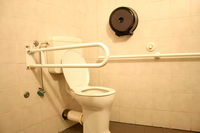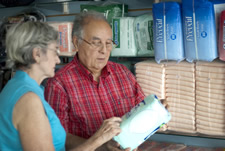Toileting and Incontinence


Over time, persons with dementia may have difficulties using the bathroom, and may even experience incontinence. This page offers tips for makeing toileting easier for your loved one, describes the common causes of incontinence and describes ways to "control and manage" incontinence. Before reading the content on this page, it may be beneficial to review the following video(s) from the Office of Rural Health (ORH).
Dealing with Incontinence
Length: 04:32
Harold has an accident in his bed overnight. He’s ashamed and anxious. Margaret must learn the steps to help decrease accidents.
Tips for Making Toileting Easier
Make it as easy as possible for your loved one to find and use the bathroom.
- Leave the bathroom door open
- Place signs/pictures on the door to make the room easier to find
- Leave a light on in the bathroom at night so your loved one can easily find the bathroom
- Adaptive equipment may make getting to the bathroom easier and safer for your loved one. These include grab bars and raised toilet seats.
Incontinence
In the later stages of dementia, it is not uncommon for someone to lose control of his or her bladder or bowel. This medical term for this problem is incontinence. While losing bowel or bladder control can be part of the natural progression of dementia, there are many factors that can contribute to whether or not this occurs and the severity of the problem.
If bowel or bladder incontinence starts suddenly or worsens dramatically consult your health care provider immediately. This can be a symptom of a more serious medical issue such as infection. Some medicines, including over the counter medicines, have side effects that make incontinence more likely. It is important to bring a list of all medications both prescribed and over the counter to health care appointments.
Tips for Controlling Incontinence
Creating a Bathroom Schedule
Encouraging your loved one to go to the bathroom on a schedule can reduce the number of accidents that occur. If accidents are occurring between trips to the bathroom, you may need to increase the frequency of scheduled bathroom trips. Try to use the same toileting routine every day. Also make sure your loved one uses the toilet before leaving the house or when arriving at a destination.
Control Intake
What your loved one eats and drinks can make a difference. Colas, coffee, and tea can all increase urination. Limit intake of liquids after dinner and in the evening to help control incontinence at night time.
Watch for Non-Verbal Cues
As communication becomes more challenging, watch for non-verbal clues that indicate that your loved one needs to use the bathroom. This might include fidgeting, grunting, or moving to a different place in the room. Make notes when your loved one uses the bathroom and when accidents occur. You may find patterns that help avoid accidents in the future.
Easy to Remove Clothing
If your loved one has difficulty dressing and undressing, finding clothes that are easy to remove can reduce the number of accidents that occur. This also makes changing clothes simpler when accidents happen. Consider items with elastic bands or limit the amount of buttons, buckles, and zippers on clothing.
Managing Incontinence
If you suspect your loved one is becoming incontinent, consider using adult disposable underwear instead of regular underwear. It is possible that your loved one may be resistant to use these products. Thus, it is important to introduce these slowly and consistently. Find a fun way to get him or her to accept the product. Remember that sometimes humor is your best bet.
Incontinence Products 
A number of products are available including pads or absorptive briefs. Pads and protective products are available for beds and furniture. Consider using washable cushion covers or waterproof your own cushions by sliding them into plastic garbage bags. Make sure to bring extra pads and clothing when leaving the home for a long period of time. It is also recommended to bring an extra change of clothes in the event an accident happens.
Preventing Incontinence-Association Skin Breakdown
In order to prevent skin problems from developing, it is important to make sure that your loved one remains clean and dry after accidents occur. Recognize changes in your loved one's skin condition to prevent skin breakdown. Use soft pads and clothing and keep them wrinkle free.
- If the skin is too dry, moisten with ointment or lotion
- If the skin is too moist, dry it with powder
Additional Resources 
VA Resources 
US Department of Veterans Affairs
VA values your commitment as a partner in our pledge to care for those who have "borne the battle." We have several support and service options designed with you in mind. The programs are available both in and out of your home to help you care for yourself and the Veteran you love.
- Caregiver Support Network
- VA Caregiver Support Line: 1-855-260-3274
Geriatrics and Extended Care Services (GEC) is committed to optimizing the health and well-being of Veterans with multiple chronic conditions, life-limiting illness, frailty or disability associated with chronic disease, agining or injury. This VA site reviews information on delirium, dementia and Alzheimer's care, decision making, home and community based services, and advance care planning, among many other important topics that may be important for you as a caregiver.
Veteran's Crisis Line Phone: 1-800-273-8255 (Veterans Press 1)
The VA does not endorse the following resources or guarantee that their information is 100% accurate. However, you may be able to find some helpful information by visiting the following pages:
Alzheimer’s Association
Personal Care: Assisting a Person with Middle-or Late-Stage Dementia with Daily Needs
References: Information adapted from Alzheimer’s Association and Office of Rural Health
If you have any questions or concerns, contact Dementia Caregiver Web Support.



















